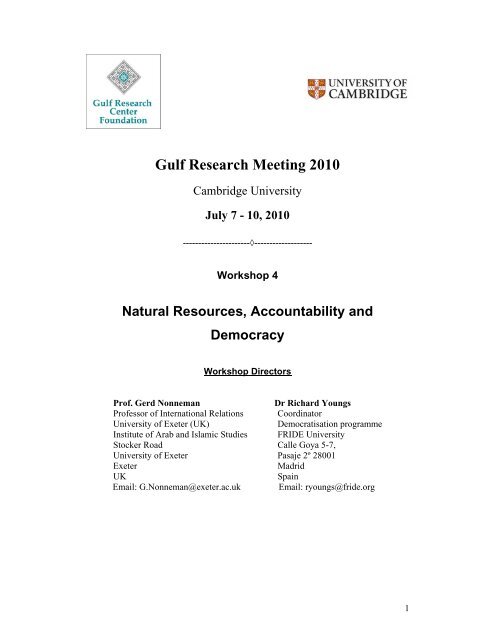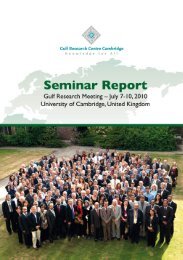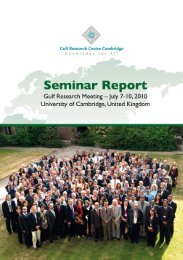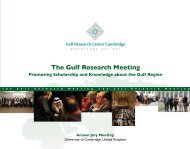Gulf Research Meeting 2010 - Gulf Africa Investment Conference
Gulf Research Meeting 2010 - Gulf Africa Investment Conference
Gulf Research Meeting 2010 - Gulf Africa Investment Conference
You also want an ePaper? Increase the reach of your titles
YUMPU automatically turns print PDFs into web optimized ePapers that Google loves.
<strong>Gulf</strong> <strong>Research</strong> <strong>Meeting</strong> <strong>2010</strong><br />
Cambridge University<br />
July 7 - 10, <strong>2010</strong><br />
----------------------◊-------------------<br />
Workshop 4<br />
Natural Resources, Accountability and<br />
Democracy<br />
Workshop Directors<br />
Prof. Gerd Nonneman Dr Richard Youngs<br />
Professor of International Relations Coordinator<br />
University of Exeter (UK) Democratisation programme<br />
Institute of Arab and Islamic Studies FRIDE University<br />
Stocker Road Calle Goya 5-7,<br />
University of Exeter Pasaje 2º 28001<br />
Exeter Madrid<br />
UK Spain<br />
Email: G.Nonneman@exeter.ac.uk Email: ryoungs@fride.org<br />
1
Workshop Description<br />
This workshop aims to re-examine both the generic linkages between natural resources<br />
and ‘democratisation’, and the specific case of the oil exporting states of the <strong>Gulf</strong> –<br />
indeed using the latter the throw light on the former. This is important for at least three<br />
reasons: (1) very little notice has been taken of Middle Eastern, and especially <strong>Gulf</strong>,<br />
case studies, in the broader literature on the subject; (2) the region has long presented a<br />
peculiar case, with exceptional resources combining with apparently exceptional<br />
resilience of traditional systems; and, not least, (3) these economies are arguably<br />
undergoing a slow evolution beyond pure rentierism, while possible emerging new<br />
socio-political trends may be in part linked to this. Both empirically and conceptually,<br />
then, a significant contribution remains to be made.<br />
The literature on the link between resources and democracy is both wide and diverse,<br />
and contested. It ranges from suggested links between wealth and democracy, to the<br />
opposite suggestion in early rentierism literature on the Middle East where rentierism<br />
was claimed to be a key factor in explaining the absence of political participation at the<br />
same time as the survival of regimes. 1 Oil wealth in particular, and natural resource<br />
wealth more generally, have been argued, for instance by Terry Karl, to lead almost<br />
inexorably to authoritarian / autocratic government, or at least to be negatively<br />
correlated with ‘democracy’, ‘democratisation’, or more broadly political participation<br />
and accountability. 2<br />
The nature of such links, the mechanisms explaining them, and the variables that<br />
support them, intervene, or cut across them, remains incompletely understood. So does<br />
the extent to which hydrocarbon-based rentierism itself remains an adequate description<br />
of the GCC economies, and even more so of their political economies. Some recent<br />
work on the GCC economies has suggested that fledging shifts are indeed occurring that<br />
1 See e.g. Beblawi, H. & Luciani, G, (eds.), The Rentier State (London: Croom Helm, 1988).<br />
2 Terry L. Karl, The Paradox of Plenty: Oil Booms and Petro-States (University of California Press,<br />
1997); Terry L. Karl, ‘Oil-Led Development: Social, Political, and Economic Consequences’,<br />
CDDRL Working Paper, no. 80 (Stanford University, 2007) (http://iisdb.stanford.edu/pubs/21537/No_80_Terry_Karl_-_Effects_of_Oil_Development.pdf);<br />
Michael Ross,<br />
‘Does Oil Hinder Democracy?’, World Politics, 53 (April 2001), pp. 325–61.<br />
2
are changing the nature of at least parts of these economies. 3 At the same time, some<br />
recent work on these countries’ political evolution has raised the question whether they<br />
need always remain stuck in the ‘liberalised autocracy’ stage at best, or might have<br />
medium or longer term possibilities of moving beyond this. 4 Even in the current phase<br />
of more or less liberalising autocracy, does the evidence from the GCC force us to revisit<br />
Karl’s view?<br />
The GCC economies<br />
The general external perception of the Middle East and North <strong>Africa</strong> (MENA) is of a<br />
region demonstrating all the symptoms of “advanced rentierism”. Statistics for the<br />
region are not encouraging: Exports from the Arab world make up only 5.5% of global<br />
exports of which oil counts for 90% and the public sector counts for 33% of all<br />
employment in the region. Within this, clearly the GCC states would seem to be the<br />
obvious ‘front runners’, with hydrocarbon-related aspects of the economies and,<br />
especially, budget revenues, being predominant. Not a single country in the region<br />
scores above the global median of the World Bank’s index for global accountability.<br />
Yet paradoxically the countries of the <strong>Gulf</strong> Cooperation Council (GCC), once<br />
condemned as irredeemably ‘rentier’, are emerging as the most efficient economies in<br />
the region – or at least as containing some of the most efficient sub-sectors or ‘islands<br />
of efficiency.’ 5<br />
During a period of inflated energy prices, non-hydrocarbon exports from the GCC have<br />
more than doubled. Half of the GCC’s GDP comes from non-oil products and a portion<br />
of this growth stems from the expansion of the private sector rather than public sector<br />
demand. The GCC economies the share of private investment in total capital formation<br />
3 Steffen Hertog, ‘Lean and Mean’, paper presented to the Workshop on Industrialization in the <strong>Gulf</strong>,<br />
Washington: Center for Contemporary Arab Studies, Georgetown University, 27-28 March 2008;<br />
Giacomo Luciani, ‘From Private Sector to National Bourgeoisie’, in Paul Aarts & Gerd Nonneman<br />
(eds.), Saudi Arabia in the Balance (Hurst, 2005) pp. 144-181.<br />
4 Gerd Nonneman, ‘Political Reform in the <strong>Gulf</strong> Monarchies – From Liberalisation to Democratisation?<br />
A Comparative Perspective’, in A. Ehteshami & S. Wright, Reform in the Middle East Oil Monarchies<br />
(Reading: Ithaca Press, 2007), pp. 3-46.<br />
5<br />
Tim Niblock, The Political Economy of Saudi Arabia (London: Routledge, 2007); Steffen Hertog,<br />
‘Lean and Mean.’<br />
3
is now higher than that of governments. 6 In the UAE, in other ways seen as an almost<br />
archetypal hydrocarbon rentier state, the non-oil sector contributed 63% of the country’s<br />
nominal GDP in 2005. Abu Dhabi has also been engaged in a striking shrinking of its<br />
previously bloated civil service – the number of employees in the Abu Dhabi civil<br />
service had by 2008 fallen to 11,000, from 64000 just three years earlier. 7 From 2000 to<br />
2006, export of non-oil products increased by 20%. In Saudi Arabia, Gross fixed<br />
capital formation (GFCF) figures demonstrate that an inward inflow of GFCF increased<br />
from 1% between 1990-2000 to 32.1% in 2006. 8 And contrary to earlier oil booms, the<br />
governments of the region have not only been more careful and judicious in allocating<br />
spending and in budgeting, but have also carried on with key reforms. The GCC<br />
countries have clearly recognized a need to move away from the “boom and bust”<br />
cycles of the 1970s and 1980s.<br />
Economic prosperity was always bound up with the legitimacy of the <strong>Gulf</strong> monarchies.<br />
What appears to be new, is a recognition that both the need to avoid periods of ‘bust’ ad<br />
the need to build a long-term sustainable economic future, require some economic<br />
restructuring if both the economic and political aims are to be secured.<br />
While this is very much a fledgling project in progress, to varying extents <strong>Gulf</strong><br />
monarchs have been grasping the need to assure long-term survival of economy and<br />
polity through attempts at diversification and fostering of the private sector, even if this<br />
has meant delegating some of the previously centralized control of the economy. By the<br />
same token the regulatory, administrative and legal frameworks have also begun to be<br />
addressed – and not just in free-wheeling Dubai. Saudi Arabia’s judicial reforms<br />
appeared at last to get under way in practice in 2008-9, and the country topped the<br />
World Bank’s “ease of doing business” index for the MENA. 9 In recent years GCC<br />
governments have invested $1.3 trillion in programmes aimed at diversifying their<br />
economies. The recent global financial crisis may damage attempts to lure foreign<br />
investment into such ambitious projects as the new economic cities being constructed in<br />
6<br />
Steffen Hertog, ‘EU-GCC relations in the Era of the Second Oil Boom’, Munich: CAP Working<br />
Paper, December 2007, p. 7.<br />
7 N. Janardhan, ‘Economic Diversification and Knowledge Economy in the <strong>Gulf</strong>’, paper presented at<br />
the <strong>Gulf</strong> Studies <strong>Conference</strong>, Exeter University, July 3 rd 2008<br />
8 ISN ETH Zurich, ‘Saudi Arabia’s Economic Liberalisation’, December 12 th 2007<br />
9 World Bank, ‘Doing Business 2007’, www.doingbusiness.org<br />
4
Saudi Arabia. The GCC is also likely to see a considerable devaluation of its extensive<br />
$1.6 trillion assets. But this adversity (which may only be temporary) may only be<br />
leading to a redirection, not an abandonment, of attempts at reform.<br />
The link between the economy and socio-political challenges<br />
Nevertheless, solutions to the indirect, if not direct, dependence on hydrocarbon-based<br />
wealth and on cheap foreign labour, and to the looming issue of local unemployment for<br />
the ‘youth-bulge’ in the populations, are by no means obvious. This is not merely a<br />
technical-economic issue, but one intimately intertwined with the underlying political<br />
economy, or the social contract, in these polities. The creation of a competitive<br />
economy – outside some of the already existing ‘islands of efficiency’ – with a<br />
competitive indigenous labour force, is not simply a matter of legislation: it is also a<br />
matter of a long-term adjustment and improvement of education, and an inevitable<br />
adjustment in expectations of the national population – something which is unlikely to<br />
be achieved without adjustments in the social contract. Whether these can be achieved<br />
through changes in how welfare is administered, or also need political adjustment,<br />
remains open to debate.<br />
The recent apparent decoupling of economic reform from broader issues of public<br />
accountability in the <strong>Gulf</strong> region (with the partial exception of Kuwait and Bahrain)<br />
challenges the widely accepted analysis that “the existence of a sound democratic<br />
system – which includes transparency, the rule of law and accountability – is essential<br />
for the success of a market economy.” 10 Certainly, the market liberalisation and<br />
attempts at increased efficiency of this region are being led from the top; indeed, it<br />
should be observed that in certain cases where democratic institutions have been granted<br />
tangible powers, such as in Kuwait, there has been a tendency to move towards (or<br />
maintain) protectionism. Oversight of government spending is still firmly in the hands<br />
of the ruling elites in the <strong>Gulf</strong>. Yet this success in isolating political reform in pursuit of<br />
economic efficiency may be fleeting. The recent largesse accumulated in the region<br />
from energy revenues is unlikely to be repeated in scale and diversification projects may<br />
10 Hazem Beblawi, ‘Political and National Governance Reforms’, Paper presented at the IMF/AMF<br />
High-Level Seminar on Institutions and Economic Growth in the Arab Countries, Abu Dhabi,<br />
December 2006, p. 16.<br />
5
uckle under the pressure of global economic downturn. Saudi Arabia had hoped to<br />
attract $624 billion in FDI by 2020. 11 This figure may now need to be revised.<br />
The GCC despite is also not exempt from energy poverty. Lack of adequate supplies of<br />
gas have prompted both Bahrain and Oman to improve relations with Tehran, while<br />
Saudi Arabia’s diversification projects have not yet addressed a looming gas deficit.<br />
Already, various projects in the UAE have come to a halt as a result of inadequate<br />
energy supplies. 12<br />
This range of economic challenges exists both in its own right and as an integral part of<br />
the broader socio-political economy: one of the central issues inking the two is that of<br />
demography and employment. Two-thirds of the Saudi population is under 30 and,<br />
despite the boom in energy revenues, income per capita is the second lowest in the <strong>Gulf</strong><br />
Cooperation Council. 13 Current estimates calculate that Saudi Arabia’s population is<br />
expected to double between 2002 and 2025 to 48.5 million, creating a grave strain on<br />
state resources to match expectations with regard to social and economic<br />
opportunities. 14 Indeed while the GCC has undoubtedly become more open and<br />
efficient in attracting external investment, governments’ success in tackling these social<br />
problems is patchy and tentative at best.<br />
The Word Bank has noted that a grave threat to regional stability in the <strong>Gulf</strong> is “the<br />
striking weakness in external accountabilities and in access to basic political and civic<br />
rights.” 15 The lack of empowered parliaments or public institutions and the selfcensorship<br />
practiced by the region’s media are a barrier to an open discourse on future<br />
governance of the region. Nevertheless the recent reforms, although limited in the<br />
11 To date the Saudi Arabian government has also demonstrated a reluctance to invest heavily in<br />
Sovereign Wealth Funds (SWF). In 2008 Saudi Arabia announced its first SWF which was limited to<br />
$5.3 bn, much less than anticipated. The Financial Times, “Saudis to launch $5.3 bn sovereign fund”<br />
28 April 2008.<br />
12<br />
J. Dargin, ‘Trouble in Paradise – The Widening <strong>Gulf</strong> Gas Deficit’, Middle East Economic Survey, 29<br />
September 2008.<br />
13 Middle East Online, ‘Saudi oil: 75 years on, 75 more years to go’, 23 May 2008.<br />
14 N. Janardhan, ‘Economic Diversification and Knowledge Economy in the <strong>Gulf</strong>,’ Paper delivered at<br />
the <strong>Gulf</strong> Studies <strong>Conference</strong>, Exeter University, 3 July 2008.<br />
15<br />
World Bank, ‘Better Governance for Development in the Middle East and North <strong>Africa</strong>’, Washington<br />
DC, 2003 p. 62<br />
6
transfer of tangible powers to legislatures, have permitted the emergence of a public<br />
debate on political reform. This has allowed for a degree of ‘decompression’ to take<br />
place, a process carefully managed by the ruling regimes of the region. 16 In a period of<br />
economic crisis, or, in the medium and longer term, societal alongside political<br />
questions, this tentative criticism now aimed at some of the ruling regimes may become<br />
more assertive.<br />
In sum:<br />
1. these states exhibit interesting signs and ‘pockets’ of economic reform, as well as<br />
varying extents of controlled political liberalization.<br />
2. Yet they remain faced with severe medium- and long-term economic challenges and<br />
uncertainties, raising questions about the nature and prospects of their evolving<br />
economic models, and about the future of ‘rentier economics’.<br />
3. They also, to varying extents, face associated socio-political challenges and<br />
questions that are affected by, and feed into, the economic questions mentioned.<br />
While on the one hand aspects of the current social contract constrain the<br />
possibilities of economic reform, the current economic dispensation is unlikely to<br />
afford these states the means to deal with growing economic demands – not least as<br />
regards employment.<br />
4. To greatly varying degrees, population groups in these states increasingly express<br />
grievances over aspects of economic and other governance, and in some cases<br />
demand a greater say in governance overall. It is an open question whether fledgling<br />
political reforms being introduced by the regimes will contain and co-opt such<br />
demands, ultimately maintaining ‘liberalised autocracy’, or whether there are<br />
circumstances under which in some states this dynamic may lead beyond autocracy<br />
altogether.<br />
The workshop aims to address these inter-linked questions in order to explore further<br />
the debate on the effect of resource wealth on economic and political governance, in the<br />
first place in the GCC, but, by implication, also enriching the wider literature on the<br />
effects of natural resource wealth, rentierism, and economic and political reform.<br />
16 Nonneman, ‘Political Reform in the <strong>Gulf</strong> Monarchies.’<br />
7
In particular, it aims to address the following research questions:<br />
• To what extent do rentier dynamics continue to define the economy of the GCC<br />
states?<br />
• Is the GCC moving beyond economic rentierism – and if so, to what extent and<br />
how? What are the prospects, constraints and conditions?<br />
• What does the evidence from the GCC states tell us about the linkages between<br />
natural resource wealth (and hydrocarbon wealth in particular) on the one hand and<br />
political liberalization and democratization on the other? To what extent do the<br />
politics of the GCC states continue to be defined (if they ever were) by rentierism?<br />
Do the evolving dynamics of this region constitute a confirmation of, or challenge<br />
to, the general rules proposed in this regard in the wider literature (Beblawi, Karl,<br />
Ross and others) – or are they simply an exceptional case?<br />
• How does the evolving situation in energy production, export and consumption in<br />
the GCC states feed into likely patterns of economic and political reform?<br />
• Are these political systems potentially moving, or could they eventually move,<br />
beyond autocracy? What are the key factors affecting the answer to this question?<br />
• What role can or do external actors have in these dynamics and trends?<br />
8





